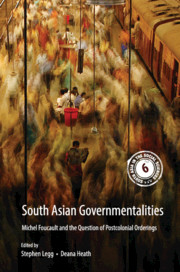Book contents
- Frontmatter
- Contents
- Acknowledgements
- Introductions
- Histories and Presents
- 3 Pastoral Care, the Reconstitution of Pastoral Power and the Creation of Disobedient Subjects under Colonialism
- 4 The Abiding Binary: The Social and the Political in Modern India
- 5 Colonial and Nationalist Truth Regimes: Empire, Europe and the Latter Foucault
- 6 Law as Economy/Economy as Governmentality: Convention, Corporation, Currency
- Subjects and Matters
- Reflection
- Contributors
- Index
5 - Colonial and Nationalist Truth Regimes: Empire, Europe and the Latter Foucault
from Histories and Presents
Published online by Cambridge University Press: 28 October 2018
- Frontmatter
- Contents
- Acknowledgements
- Introductions
- Histories and Presents
- 3 Pastoral Care, the Reconstitution of Pastoral Power and the Creation of Disobedient Subjects under Colonialism
- 4 The Abiding Binary: The Social and the Political in Modern India
- 5 Colonial and Nationalist Truth Regimes: Empire, Europe and the Latter Foucault
- 6 Law as Economy/Economy as Governmentality: Convention, Corporation, Currency
- Subjects and Matters
- Reflection
- Contributors
- Index
Summary
When did governmentality start?
As the introduction to this volume has made clear, South Asian studies have made rich use of Foucault's research, drawing at times extensively on the governmentality literature and, in fewer cases, on his governmentality lecture courses. The complexity of these courses, and their drawing upon earlier lectures and published material, raises the question ‘when did governmentality start’ in two senses: when did Foucault start articulating what governmentality is; and at what periods (and where) can we start talking about it?
Though the 1977–78 and 1978–79 courses constitute the commonly accepted ‘governmentality lectures’, the Society must be Defended lectures of 1975–76 introduced us to the concepts of biopolitics and sovereign power that would play a constitutive (if largely dropped) role in the later lectures, as would the research topics of war, race and nationalism that the lectures had focused on (Elden, 2016). It is possible to find traces in the earlier lectures of themes that would become central later on, such as confession and, even in his first lecture course of 1970–71, truth and knowledge in ancient Greece (Legg, 2016a). Though his lectures in the 1980s would use the terminology of government more than governmentality, they were consistently explicit in marking a history of governmentality.
In 1978 Foucault (2007, 108–09) had offered a threefold definition of governmentality – a type of power, the preeminence of governmental power over time and the governmentalisation of the state. The middle definition did not, however, prevent him devoting his last five years of lecturing to the classical European world, in which he located many of the (often disrupted and discontinuous) genealogies of Western subjectivities and the governmentalities which forged them. The innovation in these lectures was the focus on the individual and its relationship of self to the self (ethics).
- Type
- Chapter
- Information
- South Asian GovernmentalitiesMichel Foucault and the Question of Postcolonial Orderings, pp. 106 - 133Publisher: Cambridge University PressPrint publication year: 2018
- 3
- Cited by



